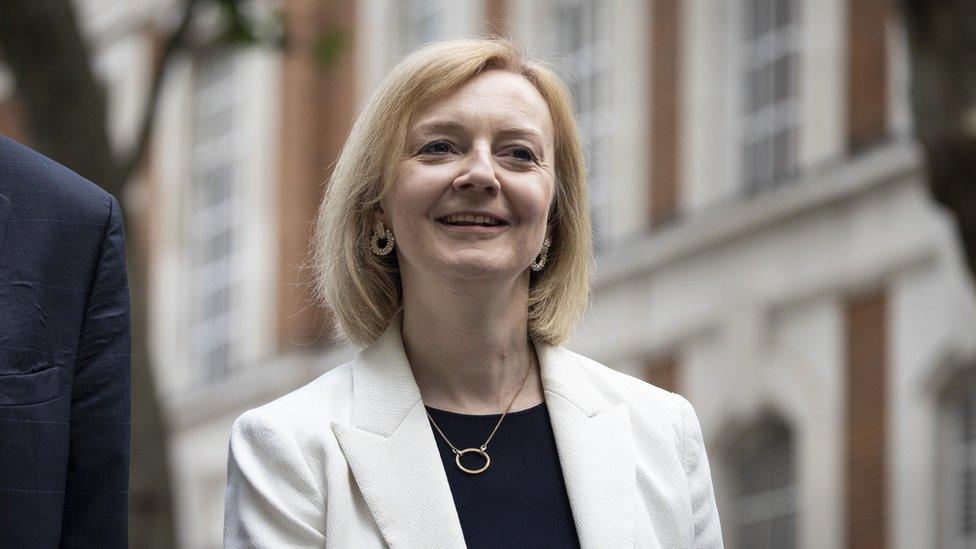Labour would repair brittle economy, vows Keir Starmer
- Published
- comments
Sir Keir Starmer: "We need three things: growth, growth, growth".
Sir Keir Starmer has promised Labour would make delivering "strong, secure and fair" growth its main priority if it won power.
In a speech, the Labour leader attacked the Tories for creating a "brittle" economy succeeding in "too few places".
He announced his party would set up a new advisory body to help boost long-term growth.
It comes as Rishi Sunak and Liz Truss trade blows over the economy in the Conservative leadership race.
In his speech in Liverpool, Sir Keir criticised the "Thatcherite cosplay" on display in the contest and accused the Conservatives of "clinging to the old ideas".
Both Tory leadership candidates have ruled out calling a snap election if they enter Downing Street. The next election has to take place by January 2025 at the latest.
In his speech, Sir Keir said "growth, growth and growth" was required to generate revenue for public services and make workers feel "fairly rewarded".
Taking a swipe at the Tory leadership hopefuls, he said former chancellor Mr Sunak was "the architect of the cost-of-living crisis," and Foreign Secretary Ms Truss was "the latest graduate from the school of magic money tree economics".
As part of his party's economic strategy, he said Labour would not "announce a single penny of day-to-day spending without saying how we would pay for it," and would "invest to meet the challenges of the future".
Sir Keir said his party would set up an Industrial Strategy Council to set out "strategic national priorities that go beyond the political cycle".
He added that the council's role would be established in law, drawing on the expertise of business, science, and unions, providing advice to politicians and holding them to account.
He also said it was possible to see economic growth while achieving the UK's target to hit net-zero - where the amount of greenhouse gas emitted into the atmosphere would be balanced by the amount removed.
Nationalisation policy
"We will not be distracted by the siren calls - from the right or the left - that say economic growth and net-zero do not go together," Sir Keir pledged.
He promised he would "challenge my party's instincts", with a focus "as much about growth and productivity, as we have done in the past about redistribution and investment".
But Sir Keir has been challenged from the left of his party, with some calling on him to fight the next election on platform of renationalising public utilities.
Writing in the Guardian, external, former shadow education secretary Rebecca Long-Bailey said the renationalisation policies in the party's 2019 manifesto were popular and it the party needs to stay "on the side of public opinion here".
Pressed on whether he would renationalise energy and water firms, Sir Keir said he would take a "pragmatic" not "ideological approach".


Sir Keir Starmer's speech made clear that the re-nationalisation of industries should no longer be considered a priority, or even a policy, for Labour.
He's talked recently about a "clean slate" after the party's 2019 manifesto which proposed to take water, energy and broadband industries into public ownership.
When running for leader, Sir Keir pledged to support "common ownership" but recently said he was "not in favour of nationalisation".
The view now from the top of the party is that re-nationalisation would not provide the economic growth the UK needs and investment in public services is a greater priority.
Sir Keir - who today admitted this approach would challenge his party's instincts - faces his own challenge to convince those in his party who see his as the wrong approach.

Meanwhile, the economy has become a key battleground in the Tory leadership race, with Mr Sunak describing Ms Truss's plan to borrow money to fund immediate tax cuts as a "fairytale".
But Ms Truss criticised tax increases introduced by her former cabinet colleague Mr Sunak, arguing they "choked off" growth.
She said the economic policies of previous Conservative and Labour governments over the past 20 years have not delivered growth.
Both candidates have suggested their proposals would be approved of by former Conservative Prime Minister Margaret Thatcher.
The pair will go head-to-head in a live TV debate later - Our Next Prime Minister will be broadcast on BBC One at 21:00 BST on Monday.

'WEAPONS CAPABLE OF ERADICATING OUR SPECIES': Matthew Syed calls for a nuclear awakening
OUR BRAINS AS PREDICTION MACHINES: How do our beliefs shape our reality?

- Published22 July 2022

- Published21 July 2022
